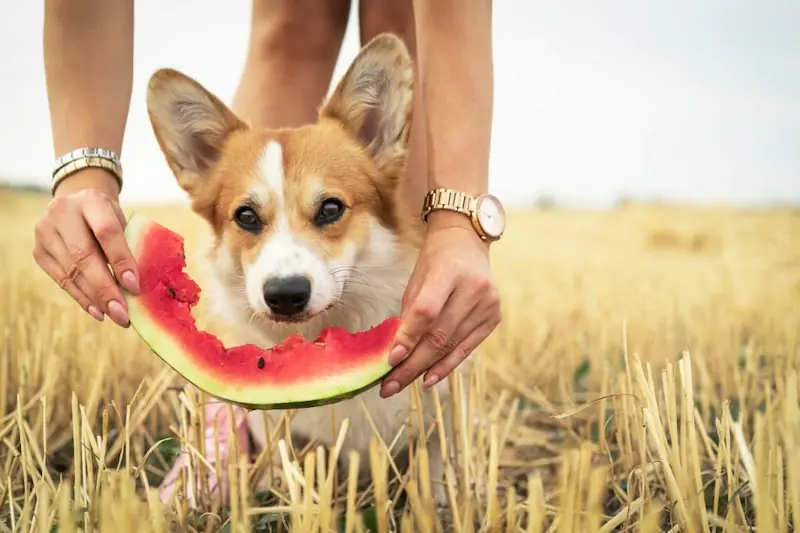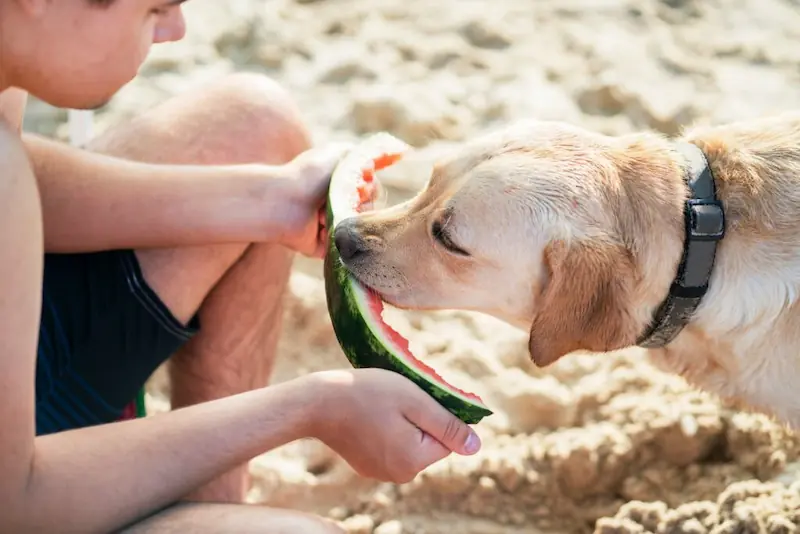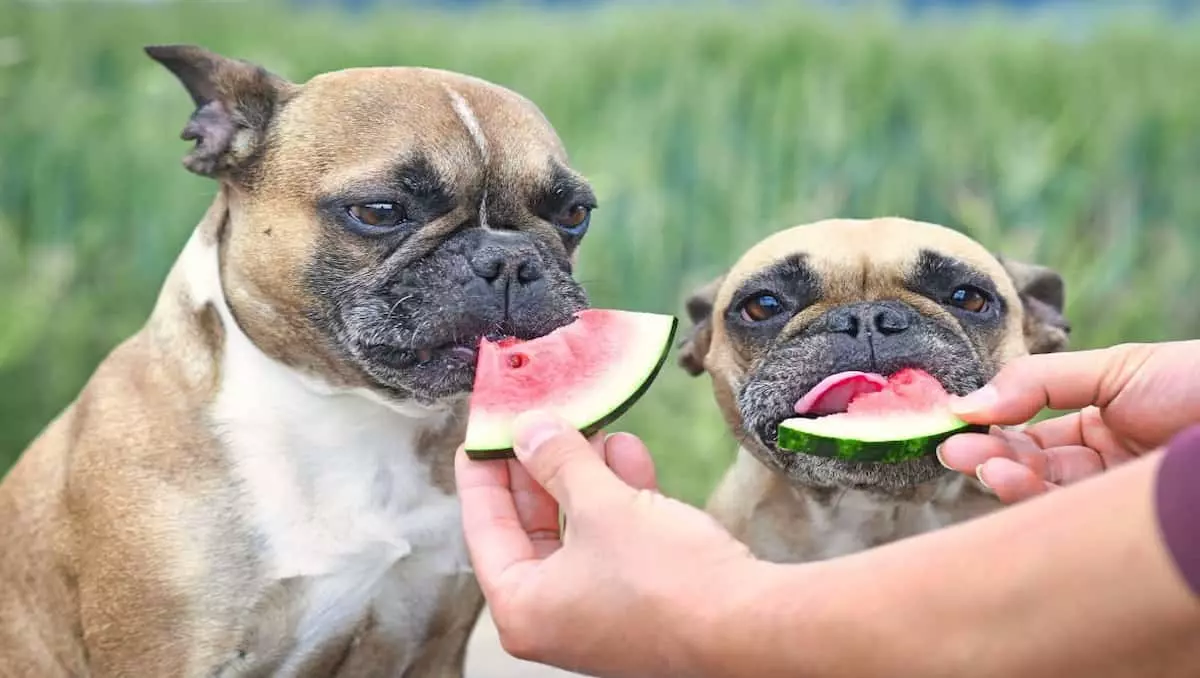On warm summer days, watermelon is among the most loved foods across the United States and is a regular fruit to be served in picnics and backyard BBQs. It’s a sweet, juicy fruit that has 92 percent water (giving the highest status among fruits with high water content) and boasts the highest amount of nutrients that other fruits possess. While it’s the most popular fruit for humans, it’s also a nutritious and hydrating treat for dogs!
With as many water and nutrients as watermelon, there are certain aspects to take into consideration when giving the treat to your dog. Let’s take an in-depth examine the benefits and precautions of feeding watermelon as a treat to your dog.
What are the benefits of watermelon for the health of my pet?

It is high in antioxidants, potassium, and vitamins C, B6, and A. It also contains Lycopene and high levels of fiber. It’s true, The Watermelon Promotions Board, a department of the USDA, declares watermelon to be a superfood. Although it’s only 92 percent water, aside from being an excellent option for drinking water in the heat of the day, the nutritional value of watermelon makes watermelon one of the most nutritious options for a nutritious snack for you as well as your dog.
READ MORE: Can Dogs Eat Raspberries? are raspberries good for dogs
Let’s dive deeper into the benefits of watermelon for your health:
- Antioxidants: Restore cells damaged due to environmental stress that is put on our bodies, and the bodies of our pets. Consider them as antioxidants that seek damaged cells, and protect the cells from decay that can break down our pets’ bodies as they get older.
- Moisture: A higher percentage (94 percent) assists in the hydration process, an important factor to consider during hot temperatures.
- Lycopene: It’s the reason that it is responsible for the gorgeous red hue of tomatoes and watermelon. It’s also helpful for cancer prevention as well as supporting sight in canines. Studies have also indicated that it reduces the risk of growth in cancer.
Potassium helps support a healthy heart and kidney function, improves bones, regulates the level of fluid, and aids in the development of muscles.
- Vitamin C is a potent antioxidant, improves immunity, and decreases inflammation.
- Fiber: Helps move food through the digestive tract to prevent constipation, aid in resolving diarrhea, and prevent obstructions.
- Vitamin A: Helps maintain the functioning and the quality of and appearance of the skin, coat, muscles, and nerves.
- Vitamin B6 is a crucial coenzyme that plays a role in brain and body functions that regulate fluid balance, make proteins manage hormones, and also support neurotransmitters inside the body of your dog.
READ MORE: slideshow-foods-your-dog-should-not-eat.html
Are there any elements of watermelon, that my dog can’t eat?

Watermelon is delicious, moist fruit dogs love to eat during hot weather, but not everything is as it appears with watermelon. There are some precautions you need to be aware of when serving this tasty treat.
The seeds of watermelon (the mature varieties) aren’t suitable for dogs. Some seeds consumed will likely not cause any harm, however, if you let your dog eat slices of watermelon, they could take in excessive amounts of seeds. If this is the scenario, the hard seeds might not pass into the digestive tract without creating a blockage in the intestinal tract. This is particularly true for small dogs that have smaller intestines than larger breeds. Therefore, taking out the seeds and giving small pieces is the ideal method to let your dog take pleasure in this delicious fruit.
READ MORE: how long can a dog go without eating before they die
Is a watermelon without seeds the best choice? Yes!
The watermelon that is seedless is the ideal option for your dog. The seeds aren’t mature enough or have insufficient volume to cause a binding within your digestive tract. It is still important to be aware of the seeds amount of the fruits, however, it’s a superior choice for dogs who like watermelon.
Can Dogs Eat Watermelon Rind?

The rind is a different part of the watermelon, but it’s not suitable for dogs. While dogs can snuff the greenish part of the skin, the inside of the rind is too tough for dogs to chew on. The digestive system of dogs isn’t able to efficiently break it down and this can result in obstruction in the intestines, just as the seeds could.
It’s recommended to remove the rind as well as the seeds prior to offering the fruit to your dog.
Can Dogs Eat Watermelon Seeds?
One or two ripe seeds accidentally ingested should not pose a problem, but if too many are ingested, they may not pass through your dog’s digestive system properly. This can lead to an intestinal blockage, especially in smaller dog breeds. Seedless watermelon is always the best choice for your dog.
Can my dog eat too many watermelons?
A lot of some things can be a cause of issues, which is exactly the same.
It is important to note that 90% of a diet for dogs should consist of regularly balanced and nutritious dog food. Watermelon and treats are only a treat on occasion, and should not comprise more than 10 percent of the diet of your dog to prevent diabetes or obesity.
The excess watermelon can trigger stomach discomfort, constipation, or diarrhea in your dog. For smaller dogs, it is best to have far less of a need for food as compared to a bigger dog.
READ MORE: 10 Mop Like Dogs – Dogs That Look Like a Mop
What is the sugar content of watermelon?
The watermelon is sweet, however, the large quantity of fiber serves as an insulation for sugar, which allows it to be released into the bloodstream more slowly than the sugar present in fruits. However, when your dog is suffering from diabetes, watermelon should not be served until your veterinarian has been informed on serving sizes and your dog’s food requirements.
What are some ways to give watermelon to my dog?
- By the chunk: Cut the watermelon into chunks, take out the seeds, and the rind then give the fruit in its fresh state to your pet.
- Freeze chunks (seeds and rinds removed) for a refreshing treat on a hot summer day.
- Pureed: Purify the fruits (seeds and the rind removed) and then place them on the ice cube tray to freeze and serve as snacks.
- Drinking watermelon for doggies: Mix it with watermelon along with other fruit that is safe for dogs such as blueberries, bananas, or pineapple, along with peanut butter or yogurt, and then freeze them in ice cube trays to make an unusual dessert. Try serving the fruit in smoothies!
- Dehydrated: The fruit can be dehydrated (minus seeds and the rind) for a tasty snack. The dehydration qualities from the fruit, however, dogs still love the treat.
READ MORE: 12 Dog Breeds That Only Have White Coats
Do you allow your dog to eat watermelon? Sure, it’s a great healthy food to choose from!
Absolutely, watermelon is among the top fruits to choose from as a treat for your pet. Its high fiber and moisture content, together with its densely packed nutrients, make it a part of the category of superfoods. When properly prepared, it’s an easy, healthy, and hydrating snack in the summer when the sun is up in the skies and your dog is in need of more fluids or an enjoyable snack. However, don’t forget that excessive watermelon consumption can cause an upset stomach, especially if your dog is a big fan of the fruit.
With all the different ways to feed watermelon to your pet, it’s difficult to overlook watermelon as a nutritious option for your dog’s snack menu!
FAQs About is watermelon good for dogs?
- Can dogs eat watermelon seeds?
It’s best to remove watermelon seeds before feeding them to your dog to prevent choking or digestive issues.
- Is it safe for dogs to eat watermelon rind?
Watermelon rind can be difficult for dogs to digest and may cause digestive upset. It’s best to remove the rind before feeding watermelon to your dog.
- Are there any health benefits to feeding watermelon to dogs?
Yes, watermelon is hydrating and contains vitamins and minerals that can support your dog’s overall health.
- What should I do if my dog eats too much watermelon?
If your dog consumes too much watermelon or experiences any adverse reactions after eating it, contact your veterinarian for guidance.
Conclusion: is watermelon good for dogs
In conclusion, watermelon can be a safe and healthy treat for dogs when fed in moderation and prepared properly. By removing the seeds and rind and introducing it gradually, you can enjoy sharing this delicious fruit with your furry friend. Remember to monitor for any signs of discomfort and consult your veterinarian if you have any concerns about feeding watermelon to your dog.

